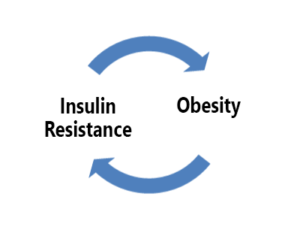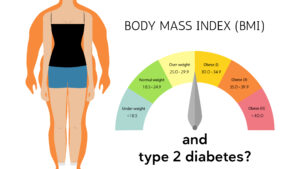Contents
What Is Obesity?

Obesity is a condition where a person has put on weight that is more than normal and affects the health of the person negatively. Obesity and overweight are often confused as the same thing. However, they are not. Overweight is just extra weight that may come from muscle, bones, or fat. Even bodybuilders are overweight but that does not mean their health is being impacted. So, being a bit overweight does not mean that you are unhealthy. However, if your weight keeps on increasing it may affect your body organs and their function. Diabetes and obesity are also interlinked.
Obesity is having 20 percent more weight than your ideal weight. To know your ideal weight, you can check your BMI (body mass index). If the BMI number is above 30, you are considered obese.
BMI has a strong relationship with diabetes and insulin resistance. More than 90% of patients with diabetes are obese. American Medical Association designated obesity as a chronic disease caused by multiple factors.
Link Between Obesity And Diabetes
Obesity is believed to be one of the major risk factors for developing type 2 diabetes. Studies show that obese people are 80 times more likely to develop type 2 diabetes than those with a healthy weight.
If we look at the history, we will understand the cause of obesity and the fastly increasing number of diabetes. It is well known that our lifestyles were way more active before industrialization. And now the world has gone digital, people don’t even have to go anywhere to buy groceries. All these facilities have made us inactive. Lack of physical activity helps in accumulating fat in the body and makes us obese. And another factor for increasing obesity is high carbohydrate food. Earlier the food that was more in trend was seafood and whole grains full of fibers and other nutrients. But now many recipes that have high carb amounts like cookies, pasta, and cuisine of different countries have been globalized. So these are the causes (lack of physical activity, high carb food) of obesity.
The cause of type 2 diabetes is still unknown, however, there are some of the factors that play a part in its development. In diabetes, our body becomes unable to use sugar for energy. In type 2 diabetes usually happens because of insulin resistance.
Obesity And Insulin Resistance

Insulin sensitivity in the body fluctuates throughout the natural life cycle. Insulin resistance is experienced during puberty, pregnancy, and aging. Some lifestyle habits like high carb intake also affect insulin sensitivity. Obesity, however, remains the main factor that is associated with insulin resistance.
In obese people, the amount of fatty acids, glycerol, hormones, and other substances is increased. These substances play a part in the development of insulin resistance. If a person is obese, the chances of developing insulin resistance are high, thus causing diabetes.
When people have too much fat, especially in the belly part, it increases the risk of diabetes. As mentioned above, abdominal fat causes cells to release chemicals that increase insulin resistance in the body. When the cells do not respond to insulin properly, the sugar accumulates in the body causing diabetes. Having a large waistline is a particularly high-risk form of obesity.
Obesity also affects the metabolism of the body. It causes fat tissue to secrete fat molecules in the blood which can affect insulin-responsive cells of the body.
Obesity And Type 1 Diabetes
Type 1 Diabetes is quite similar to type 2 diabetes, blood sugar levels rise in this type of diabetes too. Type 1 diabetes is found in children or people of young age. Although this diabetes is autoimmune in nature, a similar etiology is responsible for the increase in type 1 diabetes. Just like type 2 diabetes, the exact reason behind the rise in the incidence of type 1 diabetes is unknown, especially in young people. The association between type 1 diabetes and weight gain has been first investigated several times. Some researchers say that obesity in young age groups increases the chance of type 1 diabetes. The explanation behind this statement is increased insulin resistance in young people. It is a possible cause leading to the development of type 1 diabetes.
One study in the United States showed a significant increase in being overweight in children with type 1 diabetes. However, not enough research has been done to explain it and it needs further explanation.
Management of Obesity

The link between obesity and diabetes is clearly established. Obesity if not controlled can lead to diabetes over a short period of time. If the obese do not follow a healthy diet and start appropriate exercise, it can be hard to deal with. Along with diabetes, it brings many chronic diseases. And if you already have diabetes and are obese, it increases the risk of complications of diabetes like heart disease, eye problems, and kidney diseases.
But one good news is that losing weight even in small amounts can help in improving insulin sensitivity. The better the insulin sensitivity, the lower the risk of developing diabetes. Losing weight in diabetes can help in reducing the risk of developing heart diseases and nerve damage.
According to studies, a reduction of as little as 5% in body weight followed by regular exercise could reduce your type 2 diabetes risk by more than 50%. There are the following measures you can follow to get rid of obesity-
Low Carb Diet
You can choose to go on a low-carb diet for weight loss. Eat high-fiber food like fruits, vegetables, and whole grains to manage your weight. Fibre is a type of carbohydrate that does not get digested in the stomach. Fibre also slows down the absorption of digestive cabs. Therefore, fibre helps in losing weight and controlling blood sugar levels as well. It helps in decreasing the risk of diabetes and other diseases.
Regular Exercise
Regular intense exercise is the best way to lose weight. It shapes your body and probably is the best way to keep yourself physically active. Exercises like aerobics, yoga, Zumba, etc. are some of the easiest and effective exercises. If you have diabetes or other health problems, consult your doctor before including any heavy exercises into your daily routine. Because some exercises like heavy lifting are not good for patients who have blood pressure or heart problems.
Take a sound sleep
Not getting enough sleep could be a risk factor for obesity. A number of people do not understand the importance of good sleep. Today’s busy lifestyle can disturb your sleep cycle which has a bad impact on your health. Take a good sleep for at least 6-8 hours for the sake of your health.
Manage your stress
Keeping your mind healthy is equally important in managing obesity. Although eating healthy and exercising will help too. You can find other ways of stress management. Go swimming, spend time with your pet or friends, or do anything that makes you feel good. Sometimes people under stress start eating junk, do not do it at any cost. It will cause long-term harm for short-term comfort.
What is BMI?

BMI an abbreviation of ‘body mass index’ is a measurement that uses your height and weight to work out if your weight is healthy.
The BMI calculation divides an adult’s weight in kilograms by their height in meters squared.
BMI= kg/m2.
The results of a BMI measurement can give an idea about whether a person has the correct weight for their height.
Specifically, the value obtained from the calculation of BMI is used to categorize whether a person is underweight, normal weight, overweight, or obese depending on what range the value falls between.
For example- a person with BMI ranging between 18.5 to 24.9 has a healthy weight or ideal BMI.
A BMI range below 18.5 means the person is underweight.
And between 25- 29.9 means the person is in the overweight range.
However, a BMI range between 30 to 39.9 is the obese range.
Studies suggest that Obese people are up to 80 times more likely to develop type 2 diabetes than those with a BMI of less than 22. In fact, Obesity is the biggest root cause of Type 2 diabetes.
Obesity changes your body’s metabolism. It releases fat molecules into the blood, which affects insulin-responsive cells and leads to reduced insulin sensitivity.
Therefore, to beat diabetes, it’s important that we tackle your obesity as well.
Obesity Facts
- The World Health Organization (WHO) showed in a 2015 report 2015 that 39% of adults worldwide were suffering from obesity.
- Genetics also influence how people respond to high-calorie food. So it may be a factor that influences the weight of a certain person.
- Excessive screen time among children is also associated with higher BMI or body weight a year later.
- Europe has the highest number of adults with obesity in the United Kingdom.
- According to WHO, 2.8 million die each year because of being overweight or obese.
Conclusion
Obesity is a problem that can be treated. You just need to make some lifestyle changes as mentioned above. If you have diabetes, you need to be more careful. So, consult a doctor or your healthcare team, and discuss your health problems.
Do you want to get rid of diabetes? Join our online diabetes consultation program and reverse your Diabetes naturally through lifestyle changes such as a Personalized Diet plan, Exercise, dieticians, and health coaches.


